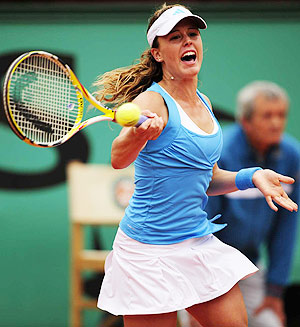Sound check: Why the grunting trend may not be so bad for tennis
Much better. Now where were we? Oh, right. Grunting. It's almost a Pavlovian reaction in modern-day tennis: As soon as some players make contact with the ball, they unleash a brief, unrestrained aria that begins somewhere deep in their guts and, eventually, can be heard counties away. Close your eyes when you watch Wimbledon matches these next few weeks; you could be forgiven for thinking the remote had inadvertently moved to a pay channel. (Yes, the women are the worst culprits.) At the French Open, the shrieks of Michelle Larcher de Brito's pierced the air so loudly they could be heard in parts of Belgium.
Grunting has become so prominent that rapper Lil Wayne sampled and looped Elena Dementieva's signature grunt on one of his singles.
Grunting, of course, is not new to tennis. Monica Seles was doing her woman-in-labor impersonation in early 1990s, prompting a London tabloid to measure her auditory output. Highly scientific and frighteningly precise, the Grunt-o-meter once determined that Seles' decibel level approached that of a 747 taking flight. Monica Seles, incidentally, is an anagram for "Camel Noises." Make of that what you will.
SSSSSUUUUUU-EEEEE!! Oh, my. How embarrassing. Sorry. Back to work.
Yet lately, grunting has become so common that when some players don't grunt, one wonders if they're trying their hardest. And this trend is unlikely to diminish anytime soon. Claiming that grunting is a vital breathing and visualization exercise, a number of junior coaches are actually teaching their students the art of it.
This is a somewhat curious phenomenon. Athletes in other sports perform tasks every bit as taxing as striking a tennis ball and still, somehow, manage to refrain from replicating noises one usually associates with a crime scene or a delivery room. When was the last time you heard a cricket bowler punctuate a delivery with a grunt? How come boxers don't warble like Axl Rose after throwing a concussive punch? Even in tennis, Andy Roddick will pound a 140-mph ace in silence. What then, accounts for, say, Maria Sharapova's unleashing a cochlea-splitting EEEEE-UHHHH!! after brushing a mid-rally backhand?
Purists, naturally, hate this trend. And, if they're too dignified to shriek about it at the top of their lungs, they're letting their displeasure be known. Martina Navratilova is among those who'd like to see (hear?) a ban on grunting.
"It's really unfair to the opponent and it's terrible for the public," she complained recently. "At the net, you need to hear the ball hit the racket so that you know how fast it's traveling. You should try and play tennis with headphones on and not hear the ball hitting the ground or hitting your opponent's racket to know what I'm talking about."
NNNNuuuuhhh-SSSSSSSuhhhhh!! Sorry. Don't know what came over me.
Apart from offering an explanation as to why attacking the net is so out of vogue in contemporary tennis, Navratilova has a point. Grunting is clearly more of an affectation than an involuntary response. If you doubt this, note the differences in "player volume" between the first game of the set and that critical game at 5-all.
Yet I'm not convinced that grunting occasions the end of civilized society as we know it. In fact, I'm not even so sure grunting is a bad thing. For years, tennis has tried desperately to debunk the image that it's not merely a wimpy country club divertissement. What underscores the strenuous nature of the sport any more forcefully than otherwise dignified players -- male and female -- screeching like train brakes when they hit the ball?
In the case of the women, I wonder if the grunting could be construed as a form of manifesto. Like adored rock stars on stage who make gestures and noises that would be considered socially unacceptable anywhere else, perhaps the women who grunt on court are, in effect, saying, "I'm the star and I'll do as I please, no matter what conventions I breach, or whom I might offend." Inarticulate as it may be, grunting is a statement. This is my territory.
If tennis is really so concerned about cracking down on gamesmanship, surely there are more grievous offenses -- blatant mid-match coaching, timeouts for highly questionable "injuries" and dubiously timed bathroom breaks, to name a few. Besides, how does one enforce a ban on grunting? We already envision this exchange:
"Warning, Miss Sharapova. Grunting."
"I wasn't grunting. I was just singing Lil Wayne."
To order a copy of Jon Wertheim's' new book, Strokes of Genius: Federer, Nadal, and the Greatest Match Ever Played, click here.





